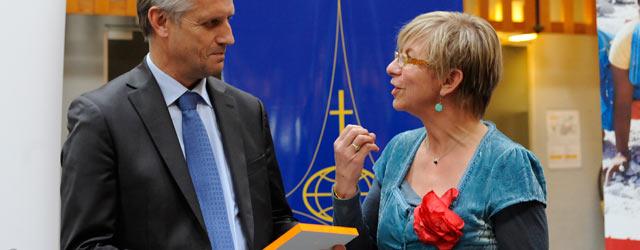LWF Equal Salary Certification Affirms Commitment to Gender Justice

(right) equal-salary Executive Director Véronique Goy Veenhuys awards the equal wage certification label to LWF General Secretary Rev. Martin Junge. © LWF/H. Putsman Penet
A Powerful Encouragement on International Women’s Day, Says General Secretary Junge
The Lutheran World Federation (LWF) Communion Office has hailed its certification today as an “equal salary” employer in Switzerland as an important step in the organization’s commitment to gender justice and women’s participation in church and society.
In the context of International Women’s Day, the Swiss organization “equal-salary” presented the LWF with the certification label for applying an equal wage policy between male and female employees.
“As we rejoice with this important achievement, we are also mindful that a large number of women in church and society don’t see a space for bringing in their gifts and talents,” said LWF General Secretary Rev. Martin Junge.
Access to their participation “is blocked, or the conditions under which they participate are fundamentally unequal,” he noted at an event celebrating the global women’s day, jointly organized by church-related organizations at the Ecumenical Center in Geneva.
Presenting the certification label to Junge, equal-salary Executive Director Véronique Goy Veenhuys commended the LWF for its “longstanding commitment to the cause of equality.” She pointed out that the LWF was the 11th organization in Switzerland and the fourth in the Canton of Geneva to receive this recognition.
She noted that while most of the organizations in the country affirm a salary policy respecting equality between women and men, the difference in remuneration is 18.4 percent on a national scale. This gap, she added, is partly due to external factors, but “around 40 percent [of such cases] result from discrimination-related factors.”
In the context of such realities, “the LWF certification can’t be received as a ‘mission accomplished’. Rather, we receive it as powerful encouragement so that we remain sensitive to gender justice as an indicator of spiritual vigor and health in the life and witness of the church,” Junge emphasized.
The general secretary said the LWF had learned during the certification process that “it is not enough to generate space where women can participate in the life and witness of churches. It is also important that women and men have the same ability to access such spaces, and even more critical that these spaces offer equal conditions for women and men to contribute their gifts and talents.”
Rev. Rudolf Renfer, director of the LWF human resources office, said he hopes the learning on gender equality would be applied to the 3,000 Department for World Service staff around the world, and that member churches would be encouraged to apply this experience in their own contexts.
“I even hope this gender equal salary certification will be a contribution to the ecumenical movement in general, as these questions are sometimes difficult to raise in church contexts,” Renfer added.
Catherine Currat, program assistant at the Women in Church and Society (WICAS) desk, described the certification as an excellent opportunity for the LWF to address challenges such as the cultural, ecclesial and political conditions that can limit women’s access to leadership positions.
“These are, however, exciting challenges in order to reach, ultimately, full gender justice,” she said. Still, Currat noted the need to develop other measures in order to have an even more gender-friendly workplace.
The LWF began the certification process in 2009 as a first step in assessing the conditions under which women participate as co-workers in its Geneva office. The Swiss Federal Office on Gender Equality gave financial support to the project.
The 62 staff persons at the LWF Communion Office represent 27 nationalities, and comprise 61.3 percent women and 38.7 percent men.
(598 words)

